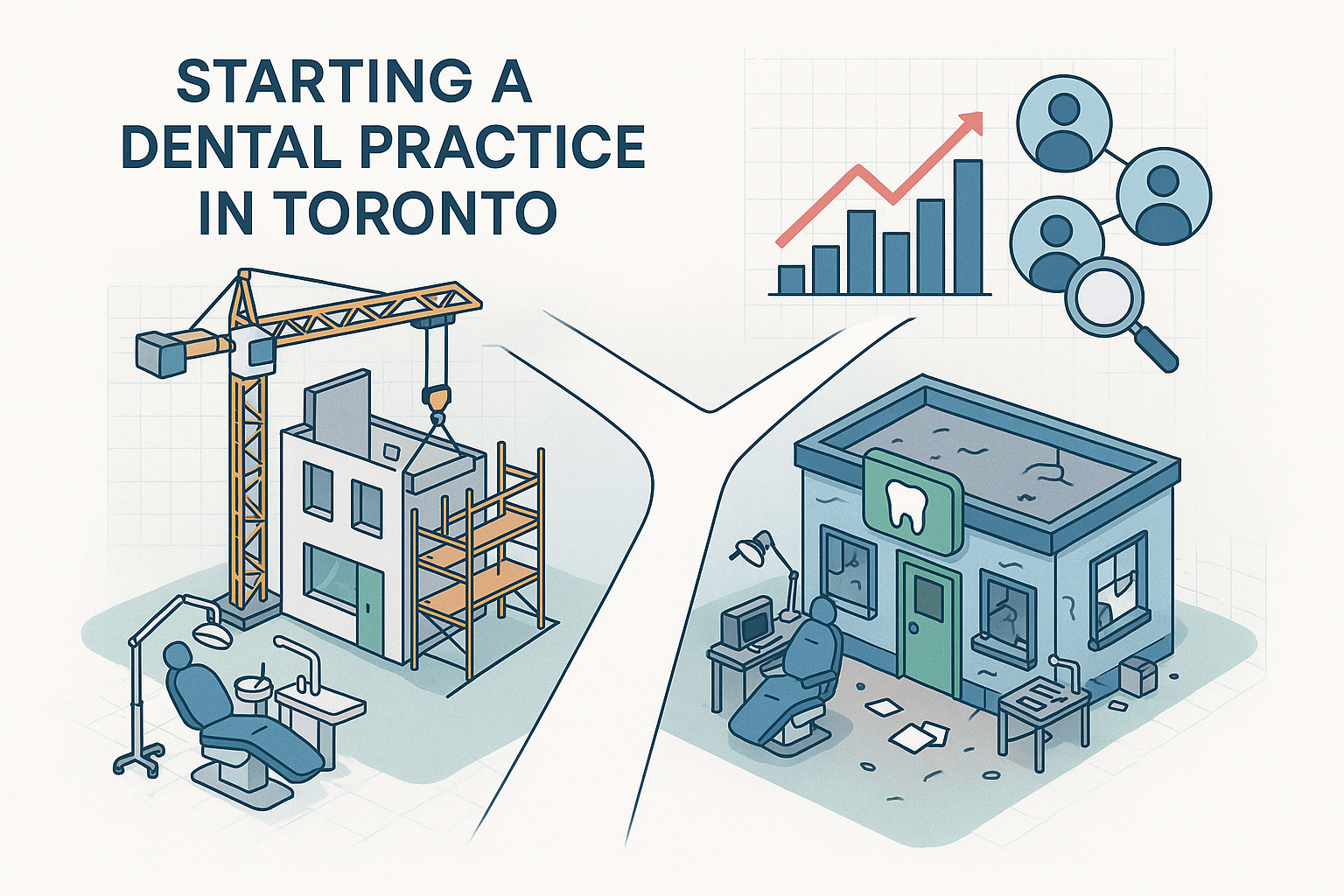Growth Is Expensive! Navigating Construction, Finances, and Hiring for Your Dental Practice

Would you rather start from scratch with $500,000 in debt or take on an existing practice and face potential chaos?
When considering how to grow or begin your dental practice in Toronto, two common options arise: build a brand-new office from the ground up, or purchase an existing clinic. At first glance, buying into an established dental practice may seem like the faster, easier route. But in reality, that path can be riddled with hidden issues—outdated systems, negative culture, non-compliant operations, and staff fatigue—adding complexity to your investment.
Making the Choice: Build vs. Buy

This dilemma hit close to home for Dr. Katie Mathis. Despite receiving competitive offers to buy existing clinics, she chose a different path: to endure the challenges of launching a clinic from scratch. Her story illustrates that while the financial risk was higher, the operational and cultural control it afforded her was worth every penny.
Key Insights from Dr. Katie Mathis

- Identifying Red Flags: Many practices for sale contain operational inefficiencies and outdated protocols. Dr. Mathis noticed worrying signs such as unclear billing structures and rigid staffing arrangements in clinics she considered buying. Avoiding these red flags enabled her to avoid inheriting long-term issues.
- Startup Debt vs. Control: While launching a clinic often involves significant borrowing—commonly upward of $500,000—the benefit is full control over culture, workflow, and technology choices. In environments like the GTA, where competition is fierce, this control is a vital asset.
- Avoiding Pitfalls: By building her own clinic, Dr. Mathis didn’t have to fix broken systems. Instead, she was able to launch with her desired standards—from digital operations and patient management software to dental supply selection.
- Strategic Planning: Creating a new dental practice requires patient research, a solid business plan, and precise execution on construction, hiring, and procurement—each detail contributing to success.

Financial Planning in Dental Startups
Your startup budget tends to balloon quickly. Between contractor quotes, permit delays, equipment installations, and deposit requirements for software or services, extra costs accumulate. New dentists in Toronto should budget strategically and forecast at least a 10–20% overage in construction and design expenses.
Products such as autoclaves, radiography systems, and dental chairs are long-term investments—yet they can drain capital fast. Look for local suppliers like EBIKO Dental that offer curated equipment packages with volume pricing and after-sale support, particularly ideal for dental professionals launching practices in the GTA.

Hiring with Intention
Building a cohesive team means more than filling roles. Dr. Mathis found that her biggest asset wasn’t her clinic’s physical layout or technology—it was her team. By starting from scratch, she carefully selected hygienists, receptionists, and associate dentists that shared her approach to patient care and teamwork.
In contrast, acquiring a clinic limits flexibility. Legacy staffing contracts, mismatched personalities, and resistance to change can create friction. When possible, budget time and resources for recruiting—with clear job descriptions and a structured onboarding process.

The Startup Ecosystem: Tools and Supplies that Matter
Starting a new clinic also allows you to choose your vendors. Rather than working with pre-existing agreements (which often prioritize price over quality), sourcing equipment and consumables from reliable, local vendors provides advantage.
EBIKO Dental provides cutting-edge dental equipment and consumables ideal for Canadian standards. Their Toronto-centric approach reduces shipping delays and helps new clinics grow faster by keeping inventory costs under control while maintaining clinical excellence.

Strategic Planning and Support Infrastructure
Site selection, layout planning, and compliance with Ontario dental regulations require upfront effort. Before breaking ground, ensure zoning, water line routing, suction system planning, and infection control strategy are reviewed by professionals. Consultants and designers familiar with the Royal College of Dental Surgeons of Ontario (RCDSO) guidelines can decrease early mistakes.
Additionally, working with integrated suppliers helps alleviate stress. Whether it’s a sterilization room layout or chair positioning, partnering with experts that know the typical GTA dental clinic landscape ensures operational efficiency.

Toronto’s Dental Market: Competitive but Full of Opportunity
The Greater Toronto Area is home to one of the most competitive dental markets in Canada. But this also means high patient demand and potential for specialized services. Practices that differentiate through exceptional patient experiences and efficient workflows succeed more frequently. Dr. Mathis’s case showed that launching from scratch, while initially expensive, allowed her to create that differentiation from Day One.
If you’re committing to a new practice in the GTA, choosing Canadian suppliers who understand the local landscape, such as EBIKO Dental, can reduce headaches and elevate your journey.
Final Thoughts
Starting a dental practice from the ground up is a huge financial and personal commitment—but it allows you to avoid legacy problems, establish modern processes, and build a practice built on your clinical philosophy. From construction choices to equipment selection and hiring, every decision shapes your future success in the Toronto market.
Before signing any contracts—rental or acquisition—take a moment to reflect, strategize, and plan. Core suppliers like EBIKO can be an essential part of that journey for professionals who are serious about crafting efficient, profitable, and patient-friendly clinics in Canada.

